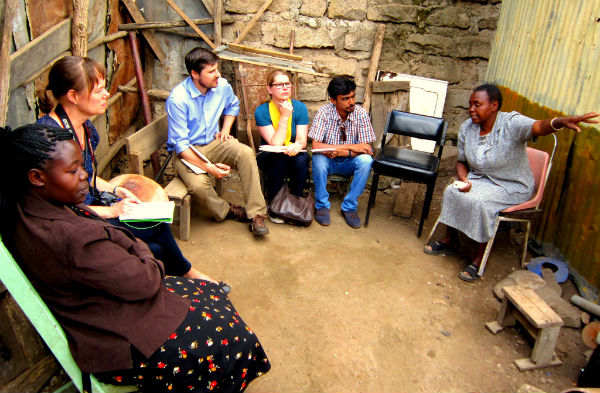Corporate Citizenship
Doing Well By Doing Good
December 12, 2017 | Written by: Jen Crozier
Categorized: Corporate Citizenship
Share this post:
Communities around the globe face an overwhelming number of intractable problems –from income inequality to climate change, to job creation and the spread of deadly and incurable diseases.
No one sector – whether government, business, academia or civil society – can tackle today’s challenges all by itself. All sectors must work together, and all must raise their game. I believe that’s why we are seeing a growing number of companies make corporate responsibility central to their business strategies. Beyond increasing financial resources to address these problems, those that focus their talent and technology to affect meaningful change deliver deeper benefits to society and to their employees.

IBM CSC members advise Kenyan female entrepreneurs from the Women’s Enterprise Fund.
For more than a century, the well-being of our employees, customers, shareholders, and communities has always been IBM’s top priority. Our approach is guided by our commitment to our core values: Dedication to every client’s success; Innovation that matters for our company and for the world. And trust and personal responsibility in all relationships.
We knew that we could not live those values simply by writing a check or sending a tweet. We would have to focus on critical issues and developing innovative solutions with measureable goals. We would have to invest our sweat equity and our people’s expertise. And we would have to form partnerships with others willing to roll up their sleeves and do the real work of change. And we would have to ensure they are both scalable and sustainable.
IBM became a leader in corporate responsibility by understanding what is required to make values real, not only with our clients, employees, and shareholders, but with the world at large.
Today, I’m delighted this has been recognized once again. IBM has been named one of America’s top corporate citizens by Forbes and JUST Capital, a nonprofit that analyzes and ranks companies based on the priorities of the American people.
JUST Capital has surveyed more than 72,000 people to find out what matters most when it comes to just business behavior, including issues such as worker pay and well-being, job creation, customer treatment, healthy communities, and the environment.
The fair treatment of workers ranked as the number one corporate expectation, and deservedly so. No company can be successful unless its employees are assured of a safe and challenging work environment, equal opportunity and the celebration of diversity.
Successful companies also continually adapt programs for employees in step with technology advances and the evolving ways families live and work. That is reflected in IBM’s investment of half a billion dollars annually in global professional development to create new pathways of growth for employees and in the expansion of the company’s parental leave policy for new moms and dads.
Workforce diversity and inclusion are also a major public concern. IBM has been fighting for Dreamers in Washington and providing same-sex partner benefits in 50 countries.
Companies are addressing the global skills crisis through a greater emphasis on workforce development, investments in skills retraining, and support for apprenticeships. I am especially pleased that more than 400 businesses have adopted IBM’s P-TECH six-year education model that is reinventing America’s high schools and equipping young people with the skills required for “New Collar” jobs.
And nothing we do will matter unless we ensure a healthy planet for future generations. That is why IBM has exceeded our worldwide energy conservation goals four years ahead of schedule and has directed the equivalent of up to $200 million in computing power, weather data, and cloud services to help scientists conduct large-scale environmental research.
This isn’t about checkbook philanthropy. The bulk of our work is being done on the ground, with employees who are contributing their expertise and gaining valuable leadership skills. Millennials have made it clear, they want to work for companies that are advancing positive change around the world. Since its launch in 2008, for example, thousands of IBMers have joined IBM’s Corporate Service Corps (CSC), delivering game-changing expertise at the grassroots level to communities in nearly 40 developing countries. Dozens of major companies have joined this movement by sending their employee volunteers to places in need.
These are today’s corporate citizens in action. One look at the headlines makes it clear – companies must be part of the solution. As head of the IBM Foundation, I’ve witnessed a growing number of businesses that are adopting a strategic approach to solving some of the most pressing challenges facing our society and planet. Now more than ever, we have a collective responsibility to work together to help ensure a just and sustainable future for all.
_______________________________________
Homepage Image: IBM Corporate Service Corps collaborated with the Peace Corps in Ghana in 2016 to help advance young women’s education and their social and economic standing. Shown are IBM CSC team members with young women from rural villages brought to Ashesi University to meet with IBM and university student mentors, who provided strategies for completing their education. (Courtesy IBM)

President, the IBM Foundation, and Vice President, Corporate Citizenship, IBM
Making the workplace safe for employees living with HIV
The recent promising news about Covid-19 vaccines is in sharp contrast to the absence of a vaccine for HIV, despite decades of research. Unlike Covid-19 with a single viral isolate that shows minimal diversity, HIV circulates in a wide range of strains that so far have proven impervious to a single vaccine. Fortunately, more people […]
Call for Code for Racial Justice Needs You: Join the Movement
IBM has never avoided taking on big challenges. At IBM, we are privileged to drive impact at scale. We take on challenges that transform our clients, impact people’s lives and innovate for future generations as we strive to effect systematic societal change. Over the course of our 109-year history, the evidence has become clear that […]
A New Wave: Transforming Our Understanding of Ocean Health
Humans have been plying the seas throughout history. But it wasn’t until the late 19th century that we began to truly study the ocean itself. An expedition in 1872 to 1876, by the Challenger, a converted Royal Navy gunship, traveled nearly 70,000 nautical miles and catalogued over 4,000 previously unknown species, building the foundations for modern […]


